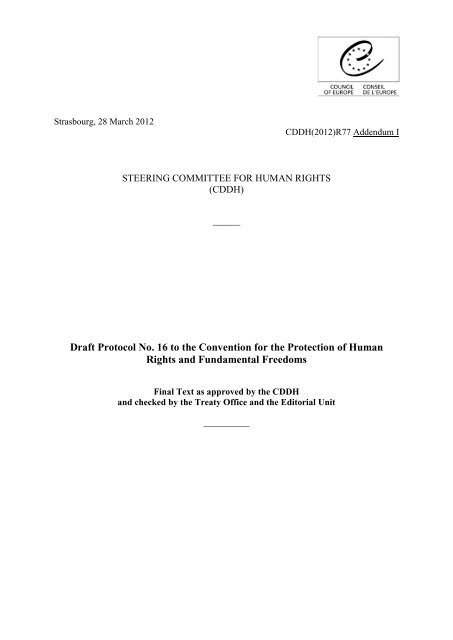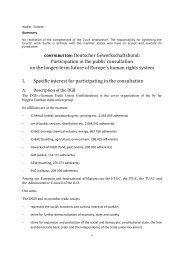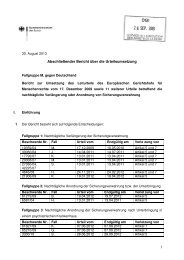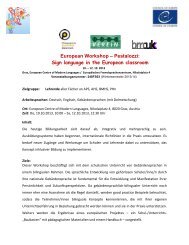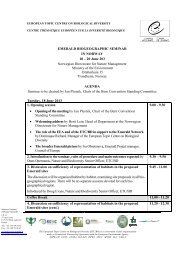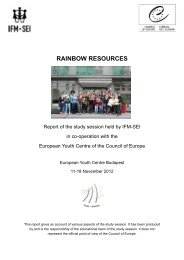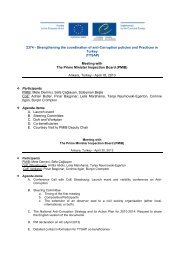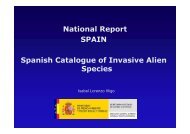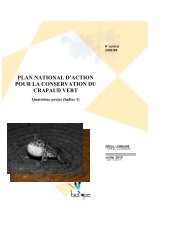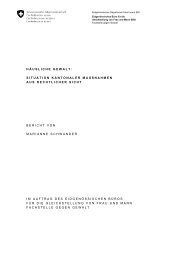CDDH(2013)R77 Addendum I
CDDH(2013)R77 Addendum I
CDDH(2013)R77 Addendum I
Create successful ePaper yourself
Turn your PDF publications into a flip-book with our unique Google optimized e-Paper software.
Strasbourg, 28 March 2012<br />
<strong>CDDH</strong>(2012)<strong>R77</strong> <strong>Addendum</strong> I<br />
STEERING COMMITTEE FOR HUMAN RIGHTS<br />
(<strong>CDDH</strong>)<br />
______<br />
Draft Protocol No. 16 to the Convention for the Protection of Human<br />
Rights and Fundamental Freedoms<br />
Final Text as approved by the <strong>CDDH</strong><br />
and checked by the Treaty Office and the Editorial Unit<br />
__________
<strong>CDDH</strong>(<strong>2013</strong>)<strong>R77</strong> <strong>Addendum</strong> I 2<br />
Preamble<br />
The member States of the Council of Europe and other High Contracting Parties to the<br />
Convention for the Protection of Human Rights and Fundamental Freedoms, signed at<br />
Rome on 4 November 1950 (hereinafter referred to as “the Convention”), signatories<br />
hereto,<br />
Having regard to the provisions of the Convention and, in particular, Article 19<br />
establishing the European Court of Human Rights (hereinafter referred to as<br />
“the Court”);<br />
Considering that the extension of the Court’s competence to give advisory opinions<br />
will further enhance the interaction between the Court and national authorities and<br />
thereby reinforce implementation of the Convention, in accordance with the principle<br />
of subsidiarity;<br />
Having regard to Opinion No. … (20…) adopted by the Parliamentary Assembly of<br />
the Council of Europe on …,<br />
Have agreed as follows:<br />
Article 1<br />
1. Highest courts and tribunals of a High Contracting Party, as specified in accordance<br />
with Article 10, may request the Court to give advisory opinions on questions of<br />
principle relating to the interpretation or application of the rights and freedoms<br />
defined in the Convention or the protocols thereto.<br />
2. The requesting court or tribunal may seek an advisory opinion only in the context<br />
of a case pending before it.<br />
3. The requesting court or tribunal shall give reasons for its request and shall provide<br />
the relevant legal and factual background of the pending case.<br />
Article 2<br />
1. A panel of five judges of the Grand Chamber shall decide whether to accept the<br />
request for an advisory opinion, having regard to Article 1. The panel shall give<br />
reasons for any refusal to accept the request.<br />
2. If the panel accepts the request, the Grand Chamber shall deliver the advisory<br />
opinion.
3 <strong>CDDH</strong>(<strong>2013</strong>)<strong>R77</strong> <strong>Addendum</strong> I<br />
3. The panel and the Grand Chamber, as referred to in the preceding paragraphs, shall<br />
include ex officio the judge elected in respect of the High Contracting Party to which<br />
the requesting court or tribunal pertains. If there is none or if that judge is unable to<br />
sit, a person chosen by the President of the Court from a list submitted in advance by<br />
that Party shall sit in the capacity of judge.<br />
Article 3<br />
The Council of Europe Commissioner for Human Rights and the High Contracting<br />
Party to which the requesting court or tribunal pertains shall have the right to submit<br />
written comments and take part in any hearing. The President of the Court may, in the<br />
interest of the proper administration of justice, invite any other High Contracting Party<br />
or person also to submit written comments or take part in any hearing.<br />
Article 4<br />
1. Reasons shall be given for advisory opinions.<br />
2. If the advisory opinion does not represent, in whole or in part, the unanimous<br />
opinion of the judges, any judge shall be entitled to deliver a separate opinion.<br />
3. Advisory opinions shall be communicated to the requesting court or tribunal and to<br />
the High Contracting Party to which that court or tribunal pertains.<br />
4. Advisory opinions shall be published.<br />
Article 5<br />
Advisory opinions shall not be binding.<br />
Article 6<br />
As between the High Contracting Parties the provisions of Articles 1 to 5 of this<br />
Protocol shall be regarded as additional articles to the Convention, and all the<br />
provisions of the Convention shall apply accordingly.<br />
Article 7<br />
1. This Protocol shall be open for signature by the High Contracting Parties to the<br />
Convention, which may express their consent to be bound by:
<strong>CDDH</strong>(<strong>2013</strong>)<strong>R77</strong> <strong>Addendum</strong> I 4<br />
a. signature without reservation as to ratification, acceptance or approval; or<br />
b. signature subject to ratification, acceptance or approval, followed by ratification,<br />
acceptance or approval.<br />
2. The instruments of ratification, acceptance or approval shall be deposited with the<br />
Secretary General of the Council of Europe.<br />
Article 8<br />
1. This Protocol shall enter into force on the first day of the month following the<br />
expiration of a period of three months after the date on which ten High Contracting<br />
Parties to the Convention have expressed their consent to be bound by the Protocol in<br />
accordance with the provisions of Article 7.<br />
2. In respect of any High Contracting Party to the Convention which subsequently<br />
expresses its consent to be bound by it, the Protocol shall enter into force on the first day<br />
of the month following the expiration of a period of three months after the date of the<br />
expression of its consent to be bound by the Protocol in accordance with the provisions<br />
of Article 7.<br />
Article 9<br />
No reservation may be made under Article 57 of the Convention in respect of the<br />
provisions of this Protocol.<br />
Article 10<br />
Each High Contracting Party to the Convention shall, at the time of signature or when<br />
depositing its instrument of ratification, acceptance or approval, by means of a<br />
declaration addressed to the Secretary General of the Council of Europe, indicate the<br />
courts or tribunals that it designates for the purposes of Article 1, paragraph 1, of this<br />
Protocol. This declaration may be modified at any later date and in the same manner.<br />
Article 11<br />
The Secretary General of the Council of Europe shall notify the member States of the<br />
Council of Europe and the other High Contracting Parties to the Convention of:<br />
a. any signature;<br />
b. the deposit of any instrument of ratification, acceptance or approval;
5 <strong>CDDH</strong>(<strong>2013</strong>)<strong>R77</strong> <strong>Addendum</strong> I<br />
c. any date of entry into force of this Protocol in accordance with Article 8;<br />
d. any declaration made in accordance with Article 10; and<br />
e. any other act, notification or communication relating to this Protocol.<br />
In witness whereof the undersigned, being duly authorised thereto, have signed this Protocol.<br />
Done at xxx, this xxx, in English and French, both texts being equally authentic, in a single<br />
copy which shall be deposited in the archives of the Council of Europe. The Secretary General<br />
of the Council of Europe shall transmit certified copies to each member State of the Council of<br />
Europe and to the other High Contracting Parties to the Convention.


